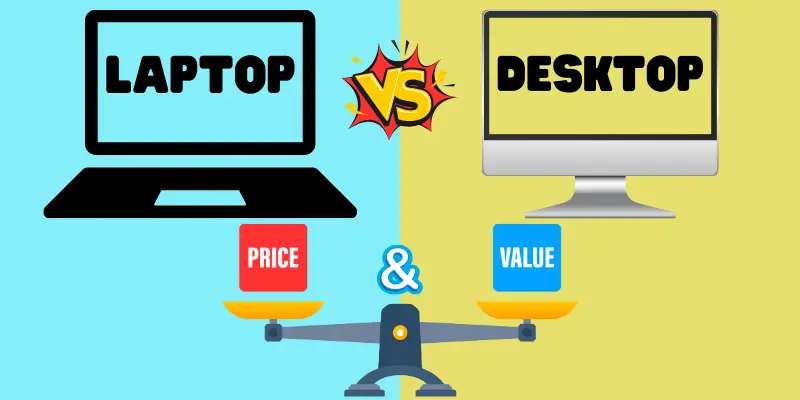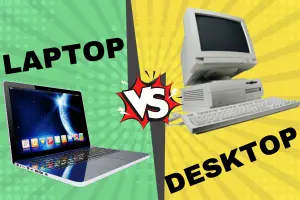Have you ever wondered whether a laptop or desktop is better for your computing needs? This is a common question many people ask when deciding on a new computer.
Laptops are portable devices that combine all the components of a computer into a single unit, making them easy to carry around. On the other hand, desktops, often called computers, are larger and typically stay in one place, offering more power and upgrade options.
This article will cover all the differences between laptops and computers to help you make an informed decision.
Definition Overview: Laptop vs. Desktop
Let’s start with the definitions to understand how these two types of computers are different.
1. Laptop
A laptop is a portable computer that you can easily carry with you. It has a built-in screen, keyboard, and touchpad, which acts like a mouse. All the components, including the battery and speakers, are packed into a single compact unit. Laptops are designed for convenience and mobility, allowing you to use them anywhere, whether at home, in the office, or on the go.
2. Desktop
A desktop, also known simply as a computer, is a larger and more powerful machine usually kept in one place, like on a desk. It consists of separate components, including a monitor (screen), keyboard, mouse, and a central unit called the tower or case, which houses the main parts of the computer. Desktops are known for their strong performance and the ability to upgrade parts easily, making them a popular choice for tasks that require a lot of power.
In this article, we will explore the differences between laptops and desktops to help you decide which is right for you.
Performance & Power: Laptop vs. Desktop
Performance and power are two key factors to consider when comparing laptops and desktops. Let’s explore these aspects in detail.

Performance
Performance refers to how quickly and smoothly a computer can complete tasks. This includes processing speed, graphics capabilities, and the ability to handle multiple applications at once.
Desktops
- Superior performance due to more significant, powerful components: Desktops typically have more space for larger and more advanced hardware, such as high-end processors and powerful graphics cards.
- Ideal for strong tasks like gaming, video editing, and 3D rendering, Desktops are well-suited for demanding applications requiring a lot of computing power.
Laptops
- Generally less powerful but sufficient for everyday tasks: Laptops are designed to efficiently handle common activities like web browsing, word processing, and media playback.
- Advancements in technology have narrowed the performance gap: Modern laptops have improved significantly and can now perform many tasks that used to require a desktop.
Power
Power refers to the energy consumption of a computer and its ability to operate without being constantly plugged in.
Desktops
- Consumes more power due to larger components: Desktops use more electricity because they have bigger, more power-hungry parts.
- Often less energy-efficient compared to laptops: Desktops can be less efficient, leading to higher energy bills and a larger environmental footprint.
Laptops
- Designed for efficiency with battery power: Laptops are built to be energy-efficient, allowing them to run on battery power for extended periods.
- Suitable for portable use without needing a constant power supply: Laptops can be used on the go without needing to be plugged in, making them ideal for travel and remote work.
Portability & Mobility: Laptop vs. Desktop
This section will cover portability and mobility and highlight the differences between laptops and desktops in these areas.
Portability
Portability refers to how easy it is to move and carry a computer from one place to another.
Laptops
- Designed for mobility, easy to carry around: Laptops are compact and lightweight, making them easy to transport in a bag or backpack.
- Ideal for students, business professionals, and frequent travelers: Because of their portability, laptops are perfect for those who need to work or study on the go.
Desktops
- Stationary and bulky, not portable: Desktops are large and heavy, with multiple components that are difficult to move.
- Requires a dedicated workspace: Desktops need a permanent spot where all parts can be set up and remain stationary.
Mobility
Mobility refers to the ability to use the computer in various locations without being restricted by power sources or connectivity.
Laptops
- Can be used anywhere with ease: Laptops can be used in different environments, such as offices, libraries, or even while traveling.
- Battery life impacts mobility: Operating on battery power allows laptops to be used without a constant power source, though battery life can limit usage time.
Desktops
- Limited to fixed locations due to size and power requirements: Desktops can’t be moved around easily because they need to be plugged in and have enough space for all components, restricting their mobility.
- Not suitable for frequent relocation: Moving a desktop is inconvenient and unsuitable for everyday transportation.
Ergonomics & Comfort: Laptop vs Desktop
This section will discuss ergonomics and comfort, focusing on how laptops and desktops differ.
Ergonomics
Ergonomics is the study of how to make computer tools fit the body of the person using them so that they are more comfortable, less stressful, and more productive.
Desktops
- Better ergonomics with separate keyboard, mouse, and large monitors: Desktops let users put each part in the most comfortable setting.
- Allows for customizable setups for comfort: Users can adjust the height and angle of monitors, keyboards, and chairs to create a personalized ergonomic setup.
Laptops
- Integrated design limits ergonomic flexibility: The all-in-one design of laptops can force users into less comfortable positions.
- External accessories can improve comfort but are less versatile: External keyboards, mice, and laptop stands can help, but they don’t offer as much ergonomic customization as desktops.
Comfort
Comfort involves how pleasant and easy it is to use the computer over long periods.
Desktops
- Comfortable for extended use with proper setup: A well-arranged desktop setup can provide maximum comfort, even during long working hours.
- Larger screens reduce eye strain: Because bigger computers have better-viewing angles, you don’t have to look down or lean over as much.
Laptops
- Compact design may cause discomfort with prolonged use: The smaller size and fixed design can lead to discomfort, especially during long sessions.
- Screen size and keyboard layout can affect comfort: The limited screen size and compact keyboard layout can strain the eyes and hands over time.
Cost & Value: Laptop vs. Desktop
In this section, we will examine cost and value, highlighting the differences between laptops and desktops in these areas.

Cost
The word “cost” refers to both the machine’s initial price and any possible costs for repairs or upgrades.
Desktops
- Generally cheaper for equivalent performance: Desktops often offer better performance for the same price as laptops due to their larger size and easier assembly.
- Easier to upgrade individual components over time: Desktops allow for easy upgrading of specific parts, such as adding more RAM or upgrading the graphics card, which can be cost-effective in the long run.
Laptops
- Initial purchase cost higher, especially for high-performance models: Laptops tend to be more expensive initially, especially if you’re looking for high-performance models with advanced features.
- Limited upgrade options often require full replacement for upgrades: Laptops have limited upgrade options compared to desktops, often requiring a full replacement rather than individual component upgrades.
Value
Value refers to the benefits and advantages of the computer and its cost.
Desktops
- Higher value for money in terms of performance per dollar: Desktops offer better performance for the money spent, making them a cost-effective choice for those prioritizing performance.
- Long-term cost-effectiveness with upgrade potential: Upgrading individual components allows desktops to maintain their value over time, potentially extending their lifespan.
Laptops
- Higher value in terms of portability and convenience: Laptops provide value through their portability and convenience, allowing users to work or entertain themselves on the go.
- Integrated features (like batteries and touchpads) add value for mobile users: Built-in features like batteries and touchpads enhance the overall value of laptops for users who prioritize mobility.
Use Cases & Special Considerations: Laptop vs. Desktop
This section will explore the various use cases and special considerations for laptops and desktops to help you make an informed decision based on your specific needs.
Use Cases
Use cases refer to the specific tasks or activities for which each type of computer is best suited.
Desktops
- Best for gaming, graphic design, and tasks requiring high performance: Desktops excel in tasks that demand significant computing power, such as gaming with high graphics settings or rendering complex designs.
- Ideal for stationary setups where portability is not essential: Since desktops are not portable, they are perfect for setups that don’t require frequent movement.
Laptops
- Suitable for students, travelers, and business professionals: Laptops are versatile and can be used by many users, including students who need a portable study tool, travelers who work on the go, and business professionals attending meetings.
- Versatile for everyday tasks, browsing, and light gaming: Laptops are capable of handling everyday tasks like web browsing, document editing, and streaming media, as well as light gaming.
Special Considerations
Special considerations include factors that may influence your decision beyond typical use cases.
Desktops
- Space requirement and dedicated workspace: Desktops require a dedicated area with enough space for the monitor, keyboard, mouse, and tower, which may not be adjustable in small or shared spaces.
- Noise levels from fans and large components: Some desktops can be noisy due to fans cooling the internal components, which may be a consideration for noise-sensitive environments.
Laptops
- Battery life and performance trade-offs: Laptops may sacrifice performance for longer battery life, so consider your priorities between performance and mobility.
- Potential overheating with intensive use: Laptops can overheat, especially during extended or demanding tasks, so proper ventilation and cooling are important.
Conclusion
Guys, now you have to decide for yourself, based on all the differences between laptops and desktops, which suits you better. So, I think all the key differences between computers and laptops are covered in detail in this article.
Therefore, before making any decision, compare each key difference and see which advantages and disadvantages are associated with laptops and which with computers, and then go with the option that offers more benefits for you.
Most Frequently Asked Questions
You can take a look at these common questions regarding “Laptop vs. Computer.”
What is a computer?
A computer is a programmable electronic device that processes data to perform tasks according to instructions.
What is a laptop?
A laptop, or notebook computer, is a portable version of a computer that integrates all components (screen, keyboard, touchpad, or mouse) into a single unit.
What are the advantages and disadvantages of computers?
Here are some benefits and limitations of using computers:
- Advantages: Typically more powerful for demanding tasks, easier to upgrade components, and generally more cost-effective for performance.
- Disadvantages: Bulky and less portable than laptops, requiring a dedicated workspace and more power consumption.
What are the pros and cons of laptops?
Here are some benefits and limitations of using laptops:
- Pros: Highly portable, suitable for use anywhere, usually comes with a built-in battery, and offers integrated features.
- Cons: Generally less powerful than desktops for intensive tasks, limited upgrade options, and potential for overheating during extended use.
What is the major difference between a laptop and a computer?
A laptop is a type of computer designed for portability, integrating all components into a single unit. The term “computer” can refer to both desktop computers (which are not portable and have separate components) and laptops.
Are desktops and computers the same?
Yes, desktops are a type of computer. “Computer” is a broad term encompassing all electronic devices capable of processing data, including desktops, laptops, tablets, and smartphones.

